World News
Justice Thomas returns to Supreme Court after 1-day absence

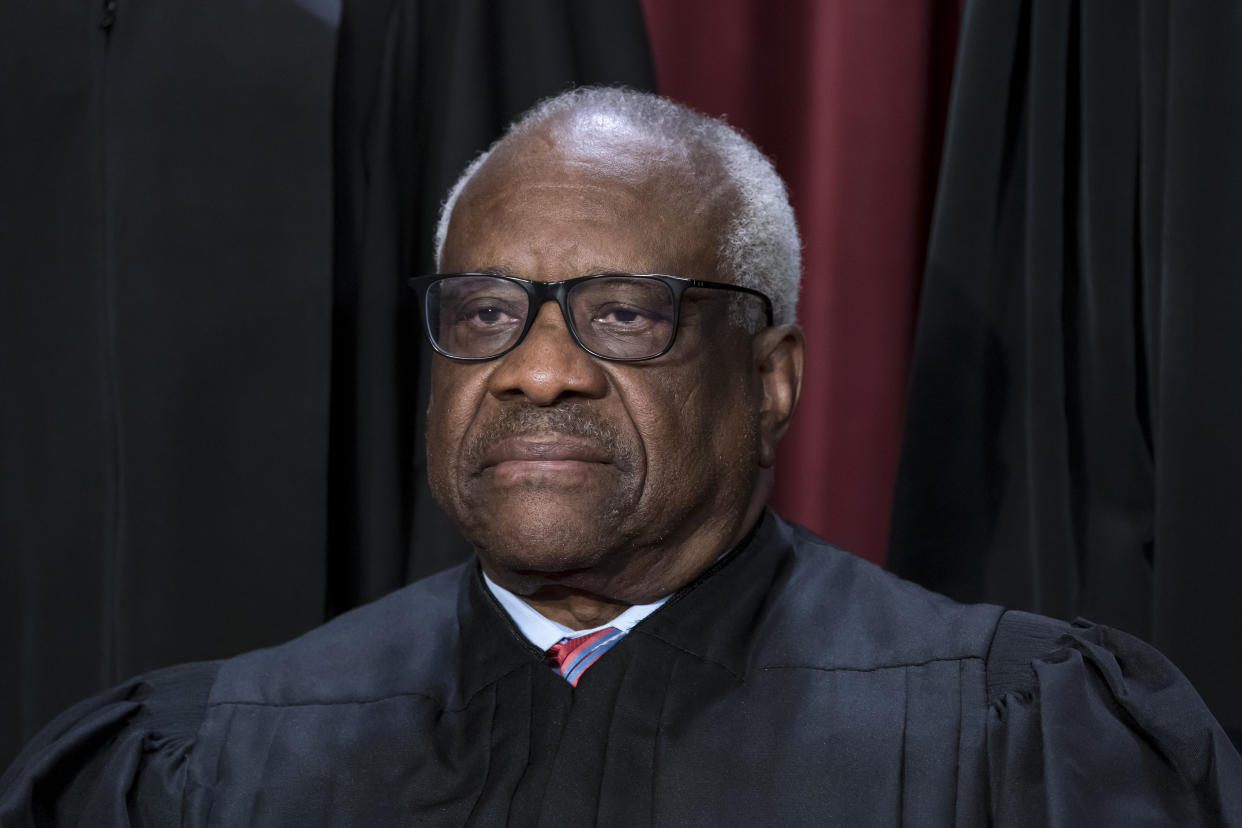
WASHINGTON (AP) — Supreme Court Justice Clarence Thomas is back on the bench after an unexplained one-day absence.
Thomas, 75, was in his usual seat, to the right of Chief Justice John Roberts as the court met to hear arguments in a case about the Capitol riot on Jan. 6, 2021.
Thomas has ignored calls from some progressive groups to step aside from cases involving Jan. 6 because his wife, Ginni, attended then-President Donald Trump‘s rally near the White House before protesters descended on the Capitol. Ginni Thomas, a conservative activist, also texted senior Trump administration officials in the weeks after the election offering support and reiterating her belief that there was widespread fraud in the election.
On Monday, Roberts announced Thomas’ absence, without providing an explanation. Justices sometimes miss court, but participate remotely. Thomas did not take part in Monday’s arguments.
He was hospitalized two years ago with an infection, causing him to miss several court sessions. He took part in the cases then, too.
Thomas is the longest serving of the current justices, joining the Supreme Court in 1991.
World News
Being Muslim in Modi’s India

It is a lonely feeling to know that your country’s leaders do not want you. To be vilified because you are a Muslim in what is now a largely Hindu-first India.
It colors everything. Friends, dear for decades, change. Neighbors hold back from neighborly gestures — no longer joining in celebrations, or knocking to inquire in moments of pain.
“It is a lifeless life,” said Ziya Us Salam, a writer who lives on the outskirts of Delhi with his wife, Uzma Ausaf, and their four daughters.
When he was a film critic for one of India’s main newspapers, Mr. Salam, 53, used to fill his time with cinema, art, music. Workdays ended with riding on the back of an older friend’s motorcycle to a favorite food stall for long chats. His wife, a fellow journalist, wrote about life, food and fashion.
Now, Mr. Salam’s routine is reduced to office and home, his thoughts occupied by heavier concerns. The constant ethnic profiling because he is “visibly Muslim” — by the bank teller, by the parking lot attendant, by fellow passengers on the train — is wearying, he said. Family conversations are darker, with both parents focused on raising their daughters in a country that increasingly questions or even tries to erase the markers of Muslims’ identity — how they dress, what they eat, even their Indianness altogether.
One of them, an impressive student-athlete, struggled so much that she needed counseling and missed months of school. The family often debates whether to stay in their mixed Hindu-Muslim neighborhood in Noida, just outside Delhi. Mariam, their oldest daughter, who is a graduate student, leans toward compromise, anything to make life bearable. She wants to move.
Anywhere but a Muslim area might be difficult. Real estate agents often ask outright if families are Muslim; landlords are reluctant to rent to them.
“I have started taking it in stride,” Mariam said.
“I refuse to,” Mr. Salam shot back. He is old enough to remember when coexistence was largely the norm in an enormously diverse India, and he does not want to add to the country’s increasing segregation.
But he is also pragmatic. He wishes Mariam would move abroad, at least while the country is like this.
Mr. Salam clings to the hope that India is in a passing phase.
Prime Minister Narendra Modi, however, is playing a long game.
His rise to national power in 2014, on a promise of rapid development, swept a decades-old Hindu nationalist movement from the margins of Indian politics firmly to the center. He has since chipped away at the secular framework and robust democracy that had long held India together despite its sometimes explosive religious and caste divisions.
Right-wing organizations began using the enormous power around Mr. Modi as a shield to try to reshape Indian society. Their members provoked sectarian clashes as the government looked away, with officials showing up later to raze Muslim homes and round up Muslim men. Emboldened vigilante groups lynched Muslims they accused of smuggling beef (cows are sacred to many Hindus). Top leaders in Mr. Modi’s party openly celebrated Hindus who committed crimes against Muslims.
On large sections of broadcast media, but particularly on social media, bigotry coursed unchecked. WhatsApp groups spread conspiracy theories about Muslim men luring Hindu women for religious conversion, or even about Muslims spitting in restaurant food. While Mr. Modi and his party officials reject claims of discrimination by pointing to welfare programs that cover Indians equally, Mr. Modi himself is now repeating anti-Muslim tropes in the election that ends early next month. He has targeted India’s 200 million Muslims more directly than ever, calling them “infiltrators” and insinuating that they have too many children.
This creeping Islamophobia is now the dominant theme of Mr. Salam’s writings. Cinema and music, life’s pleasures, feel smaller now. In one book, he chronicled the lynchings of Muslim men. In a recent follow-up, he described how India’s Muslims feel “orphaned” in their homeland.
“If I don’t pick up issues of import, and limit my energies to cinema and literature, then I won’t be able to look at myself in the mirror,” he said. “What would I tell my kids tomorrow — when my grandchildren ask me what were you doing when there was an existential crisis?”
As a child, Mr. Salam lived on a mixed street of Hindus, Sikhs and Muslims in Delhi. When the afternoon sun would grow hot, the children would move their games under the trees in the yard of a Hindu temple. The priest would come with water for all.
“I was like any other kid for him,” Mr. Salam recalled.
Those memories are one reason Mr. Salam maintains a stubborn optimism that India can restore its secular fabric. Another is that Mr. Modi’s Hindu nationalism, while sweeping large parts of the country, has been resisted by several states in the country’s more prosperous south.
Family conversations among Muslims there are very different: about college degrees, job promotions, life plans — the usual aspirations.
In the state of Tamil Nadu, often-bickering political parties are united in protecting secularism and in focusing on economic well-being. Its chief minister, M.K. Stalin, is a declared atheist.
Jan Mohammed, who lives with his family of five in Chennai, the state capital, said neighbors joined in each other’s religious celebrations. In rural areas, there is a tradition: When one community finishes building a place of worship, villagers of other faiths arrive with gifts of fruits, vegetables and flowers and stay for a meal.
“More than accommodation, there is understanding,” Mr. Mohammed said.
His family is full of overachievers — the norm in their educated state. Mr. Mohammed, with a master’s degree, is in the construction business. His wife, Rukhsana, who has an economics degree, started an online clothing business after the children grew up. One daughter, Maimoona Bushra, has two master’s degrees and now teaches at a local college as she prepares for her wedding. The youngest, Hafsa Lubna, has a master’s in commerce and within two years went from an intern at a local company to a manager of 20.
Two of the daughters had planned to continue on to Ph.D’s. The only worry was that potential grooms would be intimidated.
“The proposals go down,” Ms. Rukhsana joked.
A thousand miles north, in Delhi, Mr. Salam’s family lives in what feels like another country. A place where prejudice has become so routine that even a friendship of 26 years can be sundered as a result.
Mr. Salam had nicknamed a former editor “human mountain” for his large stature. When they rode on the editor’s motorcycle after work in the Delhi winter, he shielded Mr. Salam from the wind.
They were together often; when his friend got his driver’s license, Mr. Salam was there with him.
“I would go to my prayer every day, and he would go to the temple every day,” Mr. Salam said. “And I used to respect him for that.”
A few years ago, things began to change. The WhatsApp messages came first.
The editor started forwarding to Mr. Salam some staples of anti-Muslim misinformation: for example, that Muslims will rule India in 20 years because their women give birth every year and their men are allowed four wives.
“Initially, I said, ‘Why do you want to get into all this?’ I thought he was just an old man who was getting all these and forwarding,” Mr. Salam said. “I give him the benefit of doubt.”
The breaking point came two years ago, when Yogi Adityanath, a Modi protégé, was re-elected as the leader of Uttar Pradesh, the populous state adjoining Delhi where the Salam family lives. Mr. Adityanath, more overtly belligerent than Mr. Modi toward Muslims, governs in the saffron robe of a Hindu monk, frequently greeting large crowds of Hindu pilgrims with flowers, while cracking down on public displays of Muslim faith.
On the day of the vote counting, the friend kept calling Mr. Salam, rejoicing at Mr. Adityanath’s lead. Just days earlier, the friend had been complaining about rising unemployment and his son’s struggle to find a job during Mr. Adityanath’s first term.
“I said, ‘You have been so happy since morning, what do you gain?’” he recalled asking the friend.
“Yogi ended namaz,” the friend responded, referring to Muslim prayer on Fridays that often spills into the streets.
“That was the day I said goodbye,” Mr. Salam said, “and he hasn’t come back into my life after that.”
World News
12 arrested at UC Berkeley after abandoned building takeover
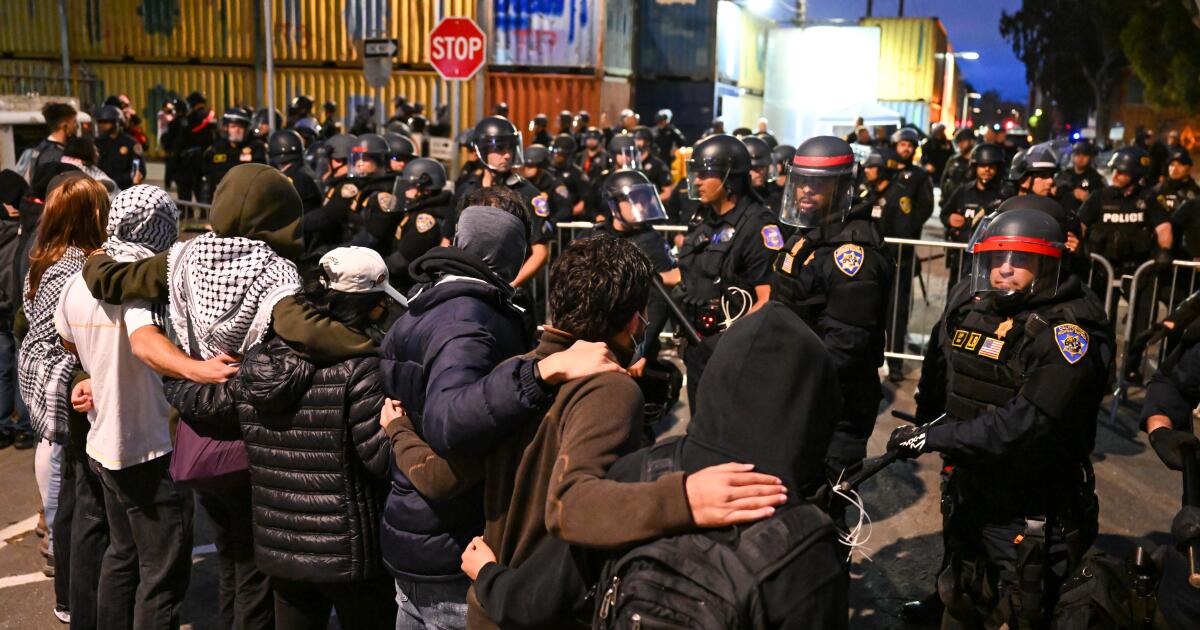
Even after UC Berkeley officials struck a deal with student leaders of the university’s longstanding pro-Palestinian encampment, a group of protesters took over an abandoned building on campus Wednesday, and some were later arrested.
The protesters occupied Anna Head Alumnae Hall, a condemned building on campus that they unofficially renamed for a Palestinian child killed this year during Israeli military operations in Gaza. The building takeover began Wednesday, one day after demonstrators removed their tents from one of the nation’s longest and largest encampments following an agreement with university officials.
About 24 hours after the group occupied the building — dropping banners and Palestinian flags from windows and pitching tents outside — police in riot gear from almost 20 agencies moved in late Thursday night and forced the demonstrators out.
There were 12 people arrested, one of whom was an enrolled student, UC Berkeley spokesperson Dan Mogulof said in a statement.
He said the standoff between officers and the protesters became violent when demonstrators blocked the hall’s entrance with plywood and shields while some used crowbars to hit officers and resist being arrested. No officers were injured because they were wearing helmets, he said. The Times wasn’t able to independently confirm if crowbars were used to hit officers.
It wasn’t immediately clear if any of those arrested were injured.
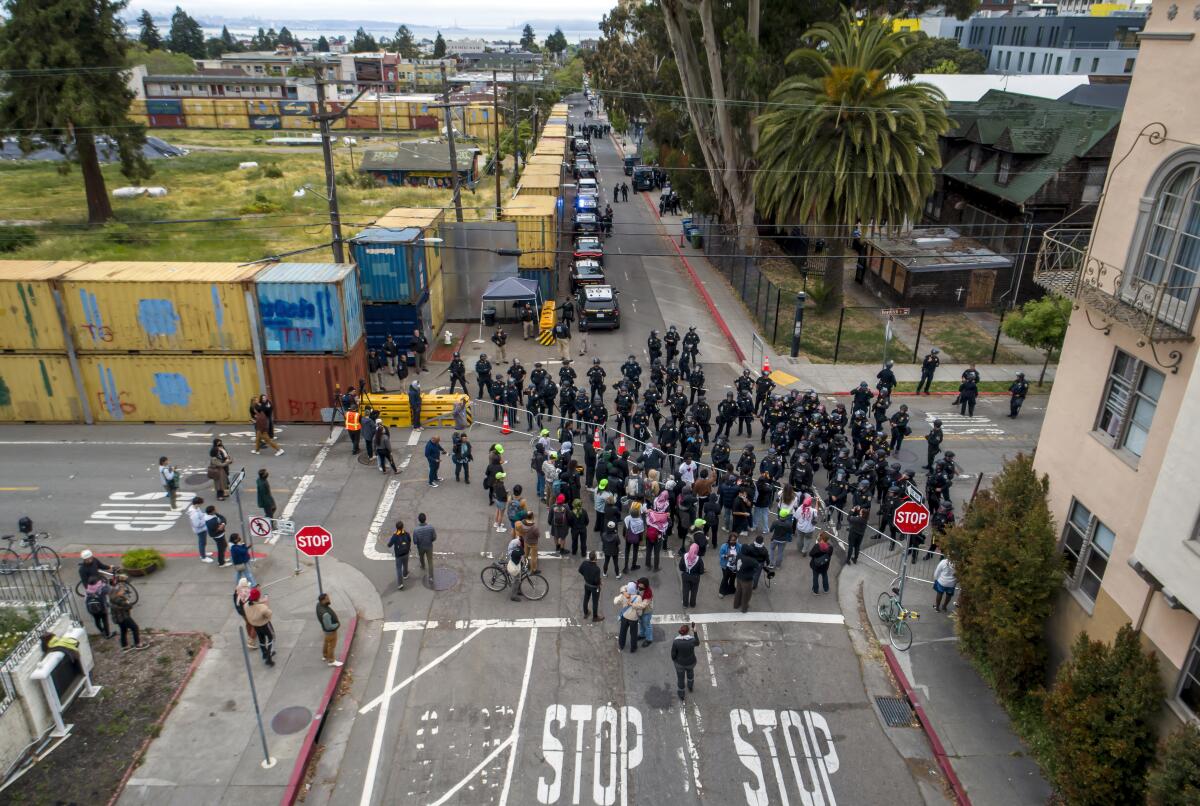
Local police and California Highway Patrol officers keep demonstrators away with barricades in Berkeley.
(Carlos Avila Gonzalez / San Francisco Chronicle)
All 12 were booked on suspicion of burglary, vandalism and conspiracy, Mogulof said. He said additional charges may be added as the University of California Police Department investigates and reviews video.
The protest action Wednesday coincided with the 76th anniversary of the Nakba, Arabic for “catastrophe,” which refers to the estimated 700,000 Palestinians who fled or were forced from their homes during the 1948 war surrounding Israel’s creation.
Many students at UC Irvine similarly commemorated the day’s history with a building takeover.
A large group there surrounded and barricaded a physical sciences hall Wednesday, but police moved in much sooner and arrested 47 people after forcing the group off campus and taking down their encampment. Administrators at UCI have not reached an agreement with student protesters as officials have at Berkeley.
There, university officials almost immediately called the building takeover, as it was playing out, “an active crime scene.”
“It is not nonviolent civil disobedience,” Mogulof said, adding that protesters were “vandalizing an unsafe, boarded-up, fire-damaged building.”
University officials tried to draw a distinction between the protesters with whom administrators reached an agreement Tuesday and the group who took over the abandoned building Wednesday.
As part of the Berkeley agreement reached Tuesday, Chancellor Carol Christ said she would initiate a discussion about the university’s investments in weapons companies and the possible divestment from them as well as issue a letter calling for an immediate cease-fire in Gaza. The move aligned the university with at least four others in the state and several across the country that have forged settlements with activists to end campus encampments that some Jewish students say have included antisemitic signage and chants.
But at least one Pro-Palestinian student group pushed back on the university’s distinction between protest groups this week.
In a “statement of solidarity” with the group occupying the abandoned hall, which they’d renamed “Hind’s House” in honor of Hind Rajab, a 6-year-old Palestinian girl who was killed during Israeli attacks in Gaza in January, the UC Berkeley Graduate Students for Justice in Palestine shared a statement during the protest saying they “reject and condemn the attempts to … fragment and divide our movement for Palestine.”
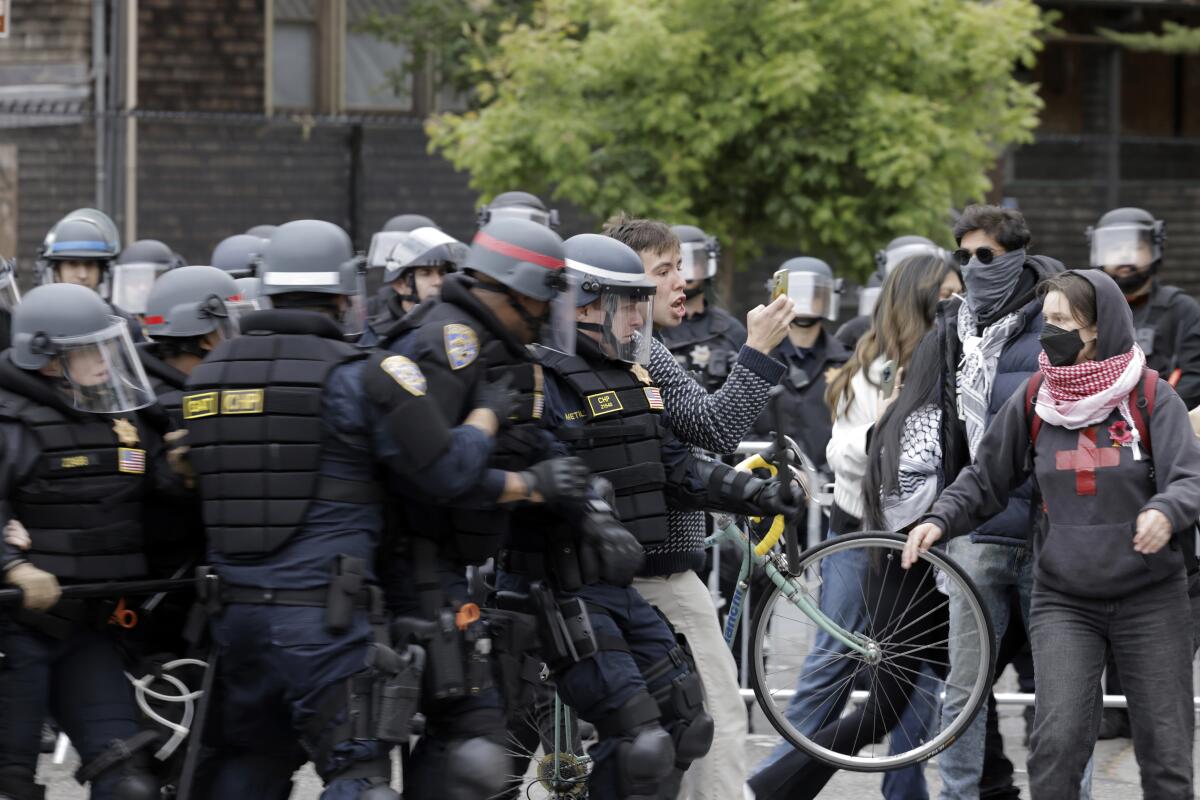
Law enforcement officials encounter protesters as officers move in to remove demonstrators inside UC Berkeley’s Anna Head Alumnae Hall.
(Carlos Avila Gonzalez / San Francisco Chronicle)
“We reject the ‘good protester’ vs ‘bad protestor’ and ‘inside’ and ‘outside’ dichtomy,” the post said, calling on the university’s administration to avoid responding to the occupation with police.
Hours later, dozens of officers in helmets faced off with the protesters, according to photos and video from the scene.
The arrests at Berkeley weren’t the only police investigations in the Bay Area this week.
In Oakland, at the University of California’s president’s office, officials are investigating recent vandalism and property damage for which a Pro-Palestinian group appears to have taken credit.
On Sunday, Oakland police officers responded to the building just after midnight, where they found broken windows and paint on the walls, Oakland police spokesperson Paul Chambers said. He said it’s being investigated as a hate-related incident.
Ryan King, a spokesperson for the UC office of the president, confirmed that the building was tagged with graffiti and had other damage. He declined to comment on a motive behind the attack.
An anonymous Bay Area blog post on Tuesday took credit for the vandalism, saying it was done in “in solidarity with the Palestinian Resistance.”
World News
Sean ‘Diddy’ Combs seen physically assaulting Cassie Ventura in 2016 surveillance video obtained by CNN
A 2016 surveillance video obtained exclusively by CNN shows Sean “Diddy” Combs grab, shove, drag and kick his then-girlfriend Cassie Ventura during an altercation that matches allegations in a now-settled federal lawsuit filed by Ventura in November.
The footage, compiled from multiple camera angles dated March 5, 2016, appears to show the rapper, producer and business mogul during an incident that, according to Ventura’s complaint, occurred at the now-closed InterContinental Hotel in Century City, Los Angeles. CNN verified the location based on publicly available photos of the former hotel’s interior.
In the video, Ventura exits a hotel room and walks to a bank of elevators. Combs, holding a towel around his waist, runs down a hall after Ventura. He grabs her by the back of the neck and throws her to the floor. Still holding his towel closed with one hand, he then turns to kick her, the video shows.
As Ventura is on the ground, Combs retrieves a purse and suitcase from the floor near the elevators. He turns around and kicks Ventura again as she lies motionless on the floor. About four seconds transpire between the two kicks, according to the video. He then briefly drags Ventura by her sweatshirt toward a room before walking away.
Ventura is then seen slowly standing up. She gathers items from the floor and moves to pick up a phone on the hallway wall near the elevators. Combs, still in a towel and socks, returns. A mirror directly across from the security camera shows Combs appearing to shove Ventura.
Seconds later, he sits down on a chair, grabs an object off a table and forcefully throws it toward Ventura. Combs is seen walking away, then turns toward Ventura once again when an elevator door opens and someone appears to exit.
Ventura, who reached an undisclosed settlement with Combs, declined to comment on the video obtained by CNN.
Ventura’s attorney, Douglas H. Wigdor, said: “The gut-wrenching video has only further confirmed the disturbing and predatory behavior of Mr. Combs. Words cannot express the courage and fortitude that Ms. Ventura has shown in coming forward to bring this to light.”
CNN has reached out to representatives for Combs and InterContinental Hotels for comment. Combs has previously denied Ventura’s allegations.
Ventura’s lawsuit
Combs and Ventura, a model and singer known for songs like “Me & U,” were in an off-and-on relationship from 2007 – 2018. The two were photographed together at the Los Angeles premiere of the film “A Perfect Match” on March 7, 2016.
According to Ventura’s complaint, which cited the altercation as occurring “around March 2016,” Combs became “extremely intoxicated and punched Ms. Ventura in the face, giving her a black eye.”
After Combs fell asleep, Ventura attempted to leave the hotel room, but he woke up and “followed her into the hallway of the hotel while yelling at her,” the complaint said.
“He grabbed at her, and then took glass vases in the hallway and threw them at her, causing glass to crash around them as she ran to the elevator to escape,” the complaint alleged.
After Ventura got in the elevator, her complaint states that she took a cab to her apartment.
“Upon realizing that her running away would cause Mr. Combs to be even angrier with her, and completely stuck in his vicious cycle of abuse, Ms. Ventura returned to the hotel with the intention of apologizing for running away from her abuser,” the complaint claims. “When she returned, hotel security staff urged her to get back into a cab and go to her apartment, suggesting that they had seen the security footage showing Mr. Combs beating Ms. Ventura and throwing glass at her in the hotel hallway.”
The complaint alleges Combs paid the InterContinental Century City $50,000 for the hallway security footage from that. The incident was part of a number of allegations made in the November lawsuit in which Ventura claimed she was raped in 2018 and subjected to years of repeated physical and other abuses by Combs.
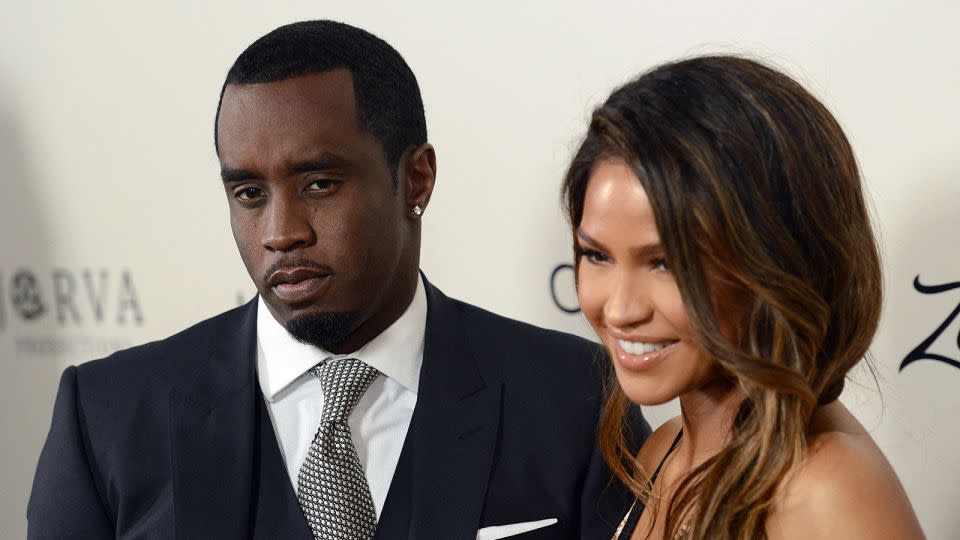

Ventura, who was formally signed to Combs’ label, claimed in her suit that he “exerted his power and influence” over her throughout the course of their professional and romantic relationship. According to the complaint, she was 19 when they met and Combs was 37, and their business relationship lasted until 2019. It detailed claims that Combs was physically violent toward Ventura and forced her to engage in various sex acts with other men during that time.
Ben Brafman, an attorney for Combs, said in a statement to CNN on the day it was filed, “Mr. Combs vehemently denies these offensive and outrageous allegations.”
The suit was resolved the following day.
“A decision to settle a lawsuit, especially in 2023, is in no way an admission of wrongdoing,” Brafman told CNN in a statement at the time. “Mr. Combs‘ decision to settle the lawsuit does not in any way undermine his flat-out denial of the claims. He is happy they got to a mutual settlement and wishes Ms. Ventura the best.”
Details of the settlement were not disclosed.
Ongoing legal issues
Since November, Combs has faced five other civil lawsuits accusing him of a range of sexual misconduct and other illegal activity. He has denied the allegations, and the cases remain active.
Authorities searched Combs’ homes in California and Florida in April as part of a federal investigation carried out by a Department of Homeland Security team that handles human trafficking crimes, according to a senior federal law enforcement official briefed on the investigation. The investigation stems from many of the same sexual assault allegations put forth in the civil lawsuits, according to a second law enforcement source familiar with the searches.
Aaron Dyer, an attorney for Combs, issued a statement at the time, calling the searches a “gross overuse of military-level force.”
“This unprecedented ambush – paired with an advanced, coordinated media presence – leads to a premature rush to judgment of Mr. Combs and is nothing more than a witch hunt based on meritless accusations made in civil lawsuits,” he said. “There has been no finding of criminal or civil liability with any of these allegations. Mr. Combs is innocent and will continue to fight every single day to clear his name.”
CNN’s Kevin Flower and Megan Thomas contributed to this story.
Editor’s Note: If you or someone you know is struggling with intimate partner violence, there are resources available, including the National Domestic Violence Hotline.
For more CNN news and newsletters create an account at CNN.com
-

 African History4 months ago
African History4 months agoBlack History Facts I had to Learn on My Own pt.6 📜
-

 African History4 years ago
African History4 years agoA Closer Look: Afro-Mexicans 🇲🇽
-

 African History1 year ago
African History1 year agoPROOF AFRICAN AMERICANS AIN'T FROM AFRICA DOCUMENTED EVIDENCE
-

 African History2 years ago
African History2 years agoHow Did Normal Medieval People Survive Winter? | Tudor Monastery Farm | Chronicle
-

 African History3 years ago
African History3 years agoThe Entire History of Africa in Under 10 Minutes – Documentary
-

 African History4 years ago
African History4 years agoA Closer Look: Afro-Mexicans 🇲🇽
-

 African History3 years ago
African History3 years agoWhat happened to the many African Kingdoms? History of Africa 1500-1800 Documentary 1/6
-

 African History1 year ago
African History1 year agoA Black African King in Medieval European Art
































